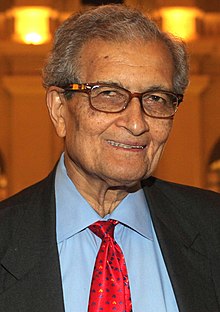Sen, Amartya

Bio: (1933-) Indian economist and philosopher. Amartya Sen got his undergraduate and B.A. degrees from Presidency College in Calcutta and later moved to Trinity College, Cambridge, where he got BA, MA, and Ph.D. degrees in Economics. During his career, he taught at many universities including Jadavpur University, Cambridge University, Delhi University, London School of Economics, Oxford University, and Harvard University. Sen served as President of the American Economic Association in 1994. In 1998, Amartya Sen was awarded the Nobel Memorial Prize in Economic Sciences for his contributions to welfare economics and his pioneering work on poverty, inequality, and development.
Sen made groundbreaking contributions to welfare economics, social choice theory, and the analysis of poverty and inequality. His work has had a profound impact on multiple disciplines, reshaping our understanding of development, justice, and human well-being. Sen's biggest contribution to economics is his development economics which rejected conventional measures of development and well-being. He criticized the overemphasis on Gross Domestic Product (GDP) as a measure of a nation's progress, rejected the validity and usefulness of Pareto’s optimum, and advocated for a broader perspective that considers people's capabilities and freedoms. While economic growth is only focused on producing more goods and services, development is focused on expanding people's capabilities, health and life expectancy, literacy, and education. Sen's influential concept of the "capability approach" emphasizes that development should be seen as a process that expands people's capabilities, enabling them to lead lives they have reason to value. He points to countries like Sri Lanka, China, and Costa Rica which expanded capabilities and opportunities for people despite low economic growth.
To better explain development Sen introduces two new theoretical concepts – “capabilities” and “functionings”. Capabilities represent the range of choices and substantive freedoms that are available to someone; while functionings are actual things that someone wants to do or be. In that sense, poverty is really a deprivation of capabilities. Capabilities and functionings determine individual welfare, while only capabilities influence the welfare of the whole society. Sen saw expanding literacy as one of the most important ways of expanding individual and collective capabilities. Sen’s approach to development influenced the creation of the United Nations' Human Development Report. Sen criticized Peter Townsend’s concept of "relative deprivation" stating that there is an “irreducible core of absolute deprivation in our idea of poverty” (Sen, 1985).
Sen also tied development to gender issues, as poverty and deprivation affect women more adversely. Lack of access to nutrition and healthcare is more pronounced in women, leading to disparity in undeveloped countries where there are statistically fewer women than men, while in developed countries the situation is reversed. For that reason, Sen advised that efforts to alleviate poverty and deprivation should focus on women – improving nutrition, finding work outside the household, improving literacy, and the like. In the book Poverty and Famines (1981) Sen explores the causes of famines and concludes that famines don't happen in democracies and that the distribution of food across the country is more important than the shortage in food supply. Democratic governments have to react to cases of famine and redistribute food in order to stay in power.
Sen abjects against what he calls a 'solitarist approach' to human identities in the book Identity and Violence: The Illusion of Destiny (2006). “Solitarism” stresses national or religious personal identity as the primary form of identity, which always places the individual in just one “identity group”. Sen argues that people don’t have any problems having multiple identities and belonging to various collectivities. The idea of singular identity and collective membership leads to mistrust and violence and generates an 'illusion of destiny'. Acceptance of the idea of the plurality of individual identities can lead to true multiculturalism.
Sen's work in social choice theory revolutionized the field by addressing the challenges of aggregating individual preferences into collective decisions. In the article “Rational Fools” (1977) Sen rejected the view of rationality that tied it to the advancement of self-interest.
Sen’s ideas have influenced a wide range of fields, from economics and political science to ethics and social policy. Sen's emphasis on human agency, empowerment of marginalized groups' capabilities, and social justice has inspired policymakers and academics to reevaluate their approaches to addressing global challenges.
Main works
Choice of Techniques: An Aspect of The Theory of Planned Economic Development (1960);
Collective Choice and Social Welfare (1970);
“The Impossibility of a Paretian Liberal”, in Journal of Political Economy (1970);
On Economic Inequality (1973);
“Poverty, an Ordinal Approach to Measurement”, in Econometrica (1976);
Real National Income. Review of Economic Studies (1976);
“Rational Fools: A Critique of the Behavioral Foundations of Economic Theory”, in Philosophy and Public Affairs (1977);
“The Welfare Basis of Real Income Comparisons: A Survey”, in Journal of Economic Literature (1979);
Poverty and Famines: An Essay on Entitlement and Deprivation (1981);
Choice, Welfare and Measurement (1982);
“Poor, Relatively Speaking”, in Oxford Economic Papers (1983);
Resources, Values and Development (1984);
Commodities and Capabilities (1985);
On Ethics and Economics (1987);
Hunger and Public Action (1989);
“Gender and Cooperative Conflicts” in Irene Tinker (ed.) Persistent Inequalities (1990);
The Political Economy of Hunger: Famine Prevention (1991);
Inequality Reexamined (1992);
“Missing Women”, in British Medical Journal (1992);
The Quality of Life. (1993);
“The Economics of Life and Death”, in Scientific American (1993);
The Political Economy of Hunger Selected Essays (1995);
Social Choice Re-examined (1996);
India: Economic Development and Social Opportunity (1996);
Development as Freedom (1999);
On Economic Inequality (1997);
Freedom, Rationality, and Social Choice (2000);
Rationality and Freedom (2002);
“Missing Women, Revisited”, in British Medical Journal (2003);
Identity and Violence: The Illusion of Destiny (2006);
Markets, money and capital: Hicksian economics for the twenty-first century (2008);
The Idea of Justice (2010);
Mismeasuring our Lives: why GDP doesn't add up: the report (2010);
Peace and Democratic Society (2011);
An Uncertain Glory: The Contradictions of Modern India (2013);
The Country of First Boys: And Other Essays (2015).

